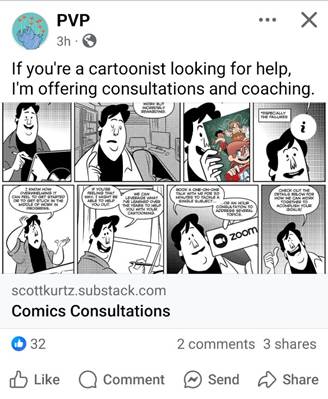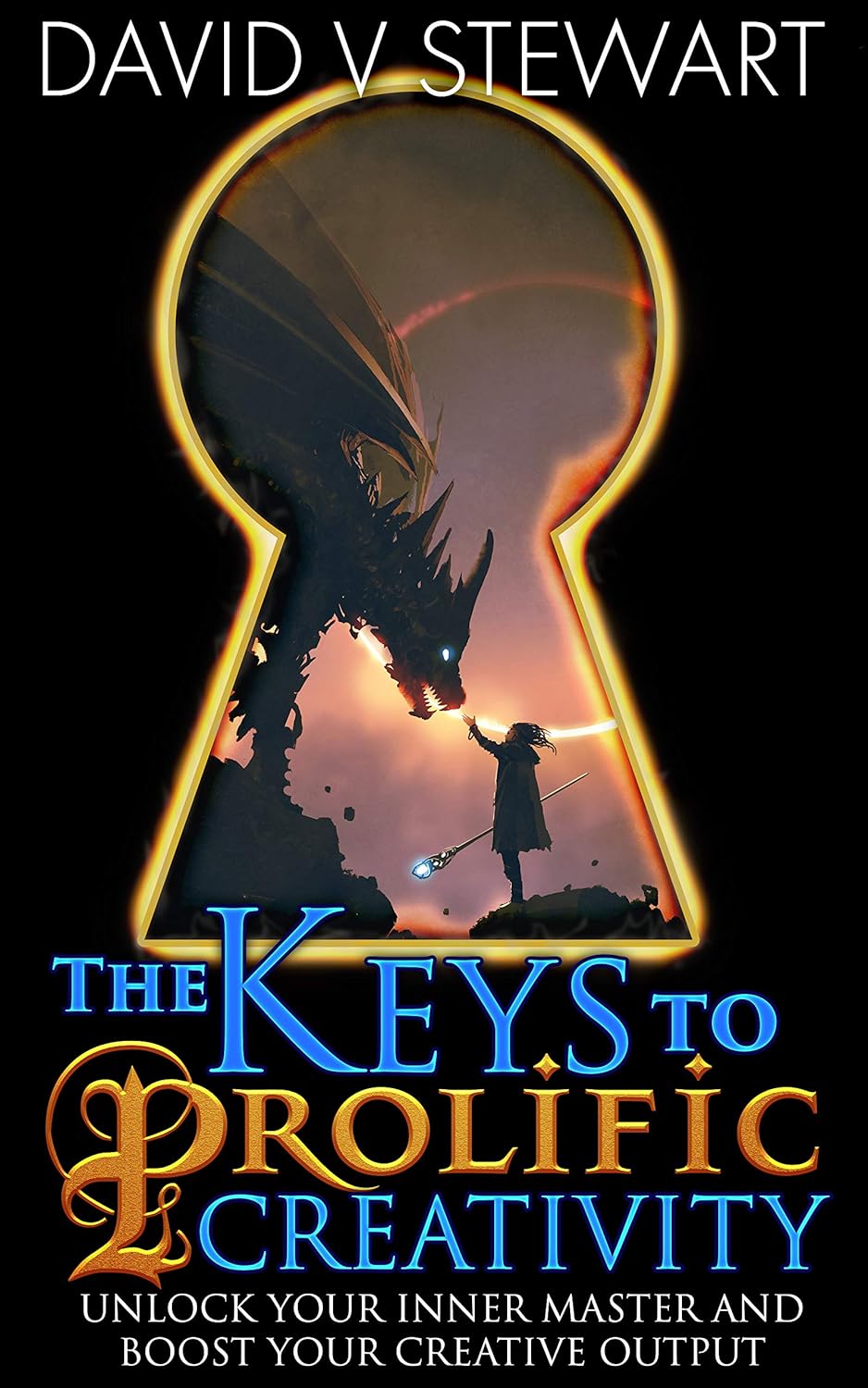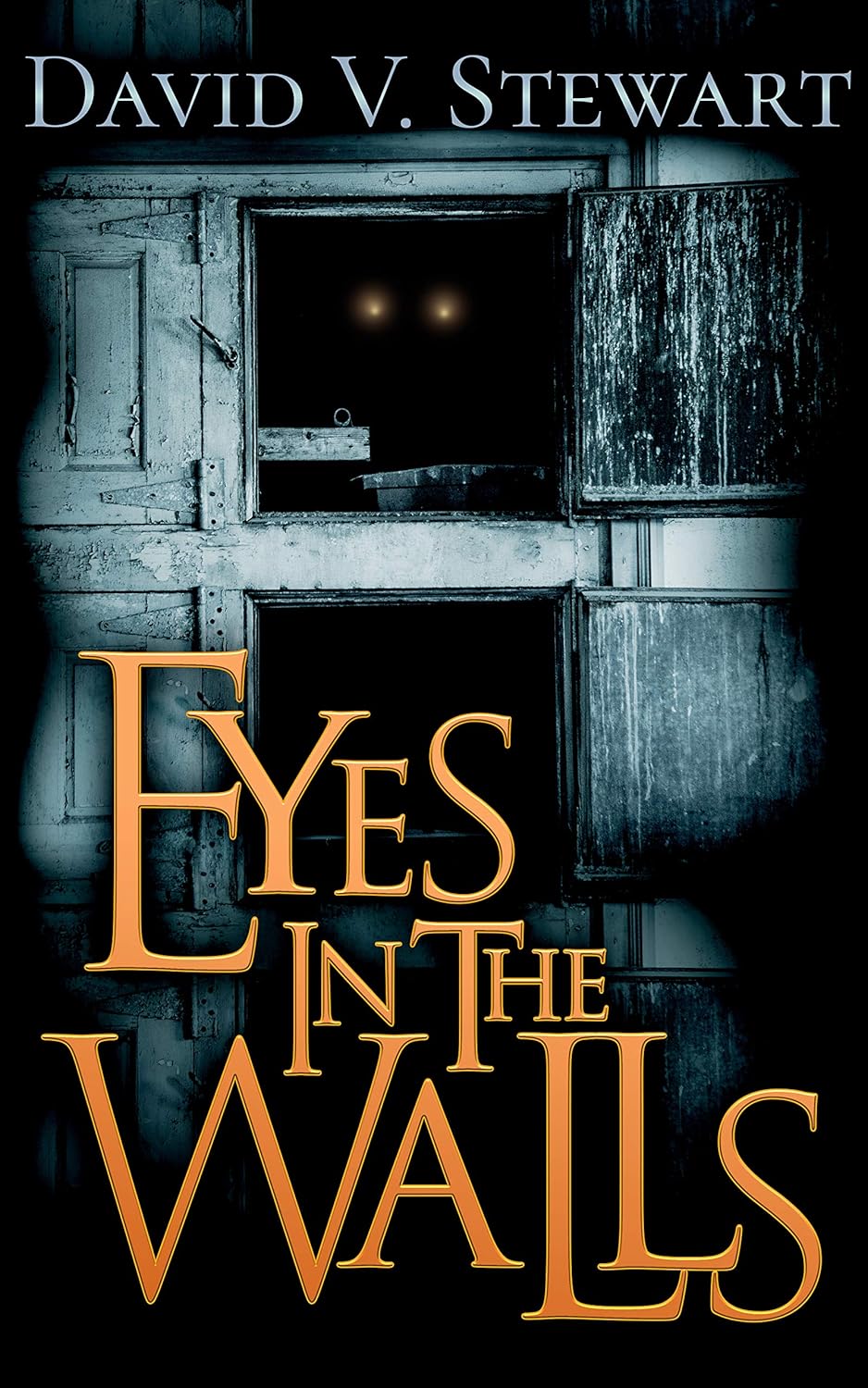It’s inevitable, and probably overdue
I saw this post from Scott Kurtz, the author/artist of the grandaddy of webcomics, PVP:

This was on Facebook originally. He hadn’t posted anything else in quite some time, and it looks like the main comic he is known for (PVP) hasn’t been publicly updated in a few years, though he did release a graphic novel through traditional publishing lanes this year. He wrote a previous blog post about the difficulties of making money in webcomics, and I suggest you also read his post about becoming successful in the early 2000s. The market has changed a lot. Paywalls didn’t seem to work, and it is difficult to move the web format into the patronage model.
But the offer for consulting signals something else to me, which is that comics, and by extension webcomics, have entered a particular paradigm that independent books have been in for a while: the author services stage.
At the crossover of artist saturation and audience decay, it becomes more profitable to sell services to artists than to make art. In essence, the market becomes the artists, and the products are services designed to improve their art in some way, either technically or in the marketing area. Independent publishing moved into this realm more than 10 years ago after the Amazon boom, and the music industry has been in the services stage for decades. In Scott’s case, he is charging 200 dollars per hour for services. That’s probably a lot more than he can make drawing and writing books.
Understand that I am not intending to crap on Scott Kurtz or anyone else here for exploring artist services. He is not the first to do this, nor am I sufficiently above this avenue of business to criticize him, having published The Keys to Prolific Creativity, which is directed towards artists, and also having built up a presence online partially by offering publishing guides and storycraft videos. While I charge for the book (which is about work habits, not “secrets” to marketing), I don’t charge for the videos (other than ads, I suppose) because I don’t want to contribute too much the services economy. I don’t want to risk becoming a parasite on naïve, hopeful artists like so many other authors. Once, I made a large portion of my living teaching music lessons – a definite kind of “artist services” business, and one that also inspired me to make my YouTube channel to begin with. My original idea was to offer all of my music knowledge for free.
The fact is, there is a lot more money in selling author services than there is in writing good books. Roping in a new author and convincing him to pay thousands of dollars for coaching, editing, cover design, and marketing services when you know that he will never recoup the investment is deceptive. This is what vanity presses did all those years ago, and we now have the same thing, just confusingly split up into various regrowing hydra-like heads that include things like “conferences” that promise to teach you how to master the Amazon algorithm, (though, of course, unlocking the secrets to what the algorithm wants you to do is making the robot into your master).
If I seem cynical, it is because I have seen many energetic and talented writers ground down by the realities of the current industry. On the one hand, you have the traditional publishing monolith, a Gormenghast fortress accessible only by observing all the correct rituals for the fickle inhabitants – and being the right kind of person to be chosen in the right moment (and probably destined for quick, rude exile). On the other hand, independent fiction is full of salesmen and few people willing to tell you to slow down, reset your expectations, and strap in for a long grind.
This is why the controversy around Mark Dawson allegedly plagiarizing his books was so enlightening. There was plenty of outrage, but there quickly emerged a sentiment: Who is Mark Dawson? Nobody had read his books, which is why it took so long to find the passages ripped out of best-sellers. Despite claiming to sell millions of books (which would put him in “cultural impact” land), only indie writers knew who he was, and that was only because he consistently sold a course on Amazon AdWords, the in-house advertising platform authors use to promote their books on Amazon. He didn’t make his money selling books, but by selling courses to authors who wanted to make money selling books. Do you see the problem?
Comics, and webcomics in particular, are substantially smaller than fiction, and while the internet of 20 years ago allowed artists the freedom to create and earn some money, web 2.0 with its emphasis on social media platforms and “content” has ground down one of the best things about the internet. Navigating to a webcomic page for a laugh or a good yarn was a habit that was slowly trained out of everyone in favor of a “feed.”
Understand that if anyone is qualified to give you advice on webcomics, it is Scott Kurtz. He was one of the originals, and he has not lacked output. He was incredibly productive for around 20 years, authoring multiple strips while making animations, videos, and lots of collaborations. Whatever criticisms you might have for his person or his work, you must admit he has actually done it all and achieved some success. But if all that work has made consulting services an economic necessity (Let’s not assume – he has passed out lots of free advice in the past), what is there to strive for? What are the success goals of his clients? He can probably give you good advice, like for writing and art, but will it be valuable? Therein lies the rub.
It’s tough out there, is what I’m saying. I have friends who are editors, and they never sell the wistful ideas of parasites (success!) but rather something finite, which is helping to polish your manuscript and grow as a writer. That’s the investment, not some promise of status or wealth. Scott is offering something similar. There isn’t any dishonesty there, but it is a sign of how the market is going. Making art isn’t enough, so services must fill the gap. The ecosystem If I created a course (which many people have encouraged me to do), it would be toward good ends in my mind—education, refinement, creativity—not “return on investment.” And we must also be honest that people’s time is worth something. I give out lots of free help, but it can’t be infinite because my time is finite. But perhaps you understand why I hesitate on a course, or on putting out an exhaustive Storycraft book.
I am aware there are other dedicated platforms for cartoons, but they don’t pay – or they pay primarily in “Exposure” rather than revenue, like so many other things. You have to figure out how to “monetize” an audience yourself. Quality comics on the web might have been a temporary boom, a small explosive opportunity for a few well-timed and talented individuals before corporate hegemony plowed it under and everything was made subject to THE ROBOT, that opaque set of algorithmic demands that must be divined by ritual, and whose prophecies are on sale to the highest bidder from magicians who promise that the mechanical god speaks in their ear.
Surely the Lord of the Great Castle will pick your art this year, if you just do what the prophet says.
I am an independent artist and musician. You can get my books by joining my Patreon, and you can listen to my current music on YouTube or buy my albums at BandCamp.







Authors offering services can benefit everyone. Here is a scenario: Small author ghost writes a comic for a bigger influencer with a large audience. The author gets more money than they would on their own and up front. The influencer gets to release a good product that the audience will come back for more. The market improves with more quality products available. Though a little bit different than the services you mentioned in the post
A thoughtful and well-considered post, as always. There’s no question that the old webcomics monetization model is failing, and that industry has yet to find a viable replacement, which means that webcomics as a medium are in trouble.
Is that why Scott Kurtz is expanding his business into creator services? Almost certainly, yes. Does the high likelihood of that circumstance support the conclusion that there’s more money in author services than in writing books? Not necessarily.
Let me show you what I mean …
(Ethics disclosure: I am a professional editor as well as a professional author).
According to publicly searchable resources like Average Pay, the top 10 highest-paid authors in the US earn a combined $220M per year. In contrast, the 10 highest-paid book editors earned $1.3M.
So in terms of sheer volume, there’s orders of magnitude more money in being an author than in author services.
Of course, the natural objection is “Those are the 10 most successful authors – folks like James Patterson, J.K. Rowling, and Stephyen King. Their degree of success is far less attainable for a new author than the low-6-figure average is for a new editor.”
And that’s a fair and accurate point.
But what is tells us is that author earnings follow a Preto distribution, whereas editor earnings follow more of a Nash distribution. And once again in the itnerest of transparency, though it varies from year to year, my author income roughly equals my editing income.
Tl; dr: There’s more money in writing books than in author services, but the latter has a more even income distribution.
If I want to learn somebody’s skills, I go see if they have a book. For instance, I admire the artist Carlos Cabral, and I bought his book about putting movement in comics. It’s been very helpful. But a course is less helpful because I can’t refer back to it in five or ten years. The people I see earning a living in webcomics are selling paperbacks, early page previews on patreon, etc. (Lots of these hard-working folks on deviantart!) I don’t know how much they earn, but every new page is a new entry point for a new reader (like me!). I don’t count webtoons artists as successful because I know what webtoons does to successful artists there.
So good.
Not completely unrelated, I’ve been meaning to ask where you learned title design for your book covers.
Not cover design, not where to get fonts, but specifically how you place the words like that and how big to make them.
Great article by the way. Painful article, but great observations.
Very well thought out essay, this is definitely something that I’ve been noticing more and more; the service side of the industry. It isn’t as though I’m an innocent, given what I do hereon Substack with WW & S&S and my Fiction Guide essays, so I suppose I shouldn’t judge. I try to make those free, but ultimately as with all things time is not infinite as you rightly pointed out.
The thing with your contributions is that they’ve been a great deal greater than mine or a great many others new to this space. I dislike the service ecosystem for the most part and have no interest in really joining it in any greater capacity. Though on your end I would recommend you do what you think is best David. I can’t imagine you ever becoming a parasite as you’re intrinsically a good man, and a great artist (musically and literarily speaking of course). So follow your heart and your mind.
Again great essay on an important topic.
I’ve noticed this. I feel that the glut of ‘content’ created by thousands of mediocre artists on the internet has driven down the value of recognizeably ‘good’ artists. The boom on youtube, the boom in webcomics, the boom in self-publication, the boom in custom art… all of it is going away now. Right now, I suspect that we’re in a resurgence of the micro-blogging days due to Xitter and substack. I suspect that’ll last 5 to 15 years and that those who made a name for themselves will find success and those who didn’t “make it” in the allotted time will be drowned out by thousands of mediocre contemporaries.
Kind of a shame about books, I’m 2/3rds the way through a novel and I’d really like to get it properly published. I don’t think most publishers accept white male authors any more though.